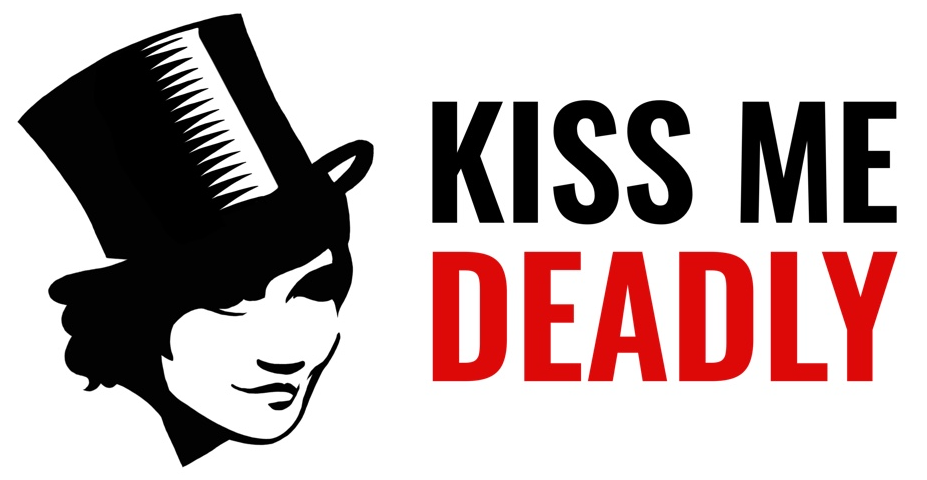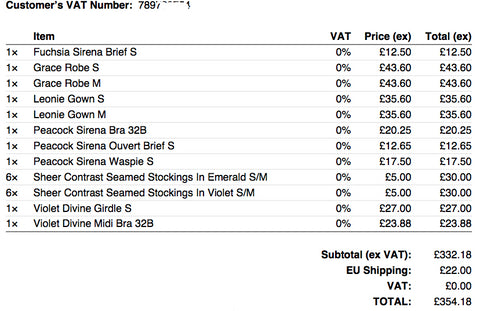In the history of posts about the boring bits of the knickers business, I suspect this might possibly be the most boring, but a surprising number of you asked for it, so... OK. But you only have yourselves to blame.
VAT - Value Added Tax - is a tax on consumption, on goods and services at the point of sale. Apparently the French invented it, but the British had a go at taxing luxury products when Pitt-The-Younger was in charge, and went after stuff like hair powder and perfume. Hair powder was a big deal in the late 1700's here!

VAT is sufficiently like a sales tax as to totally confuse people, because it's not exactly the same. The main difference is that VAT is added or taken away at every stage of the sales process.
So, the fabric suppliers charge the factories VAT, the factories charge us VAT, we charge you VAT, and we charge some shops VAT. Except when we don't... and everything has to be written up and we can pay and reclaim vat, which makes ALL the paperwork, and this really seems to confuse folk in the USA. But their buyers-state-based-sales tax does our heads in though, so hey.

Happily we didn't have to pay VAT on hair powder, because we borrowed the wig from Prior Attire instead!
Generally it's when and to whom we charge VAT to that really starts to throw people, not to mention the admin. Here's how it works.
Any UK business over the threshold (£81,000 a year turnover at the moment) has to be registered for VAT.
If you are a UK or EU customer buying from us for personal use, we charge VAT (at 20%) on top of the product cost. Unless it's a voucher. Technically we charge the VAT on a voucher when you use it on actual products, For Reasons.
But a 20% VAT rate doesn't mean 1/5th of all your spending is going to the government. It's added onto the product price, so it's actually about 17% of the cost - and only of full rate products, on which more later.
If you're a UK shop buying from us to sell on to people, then we also charge that VAT. But we format your invoice in a totally different way, because There Are Rules.

Wholesale; we have to show the customer VAT number and we have to show the price without VAT and then the VAT separately on each product.


All of that? Legally required. You should find it on all your receipts and invoices. We once made a mess and changed our invoice printing without remembering to stick it on, it was a nightmare!
If you're in the EU outside of the UK and you're a business buying to sell on, we charge VAT. UNLESS you have a VAT number, in which case we don't. Instead we send a form off to the EU every 3 months to say who we sold how much to and what their VAT number was - which we would have done for the order above.
Someone, somewhere in an office presumably buried in paperwork, checks every single one of those forms and every single one of those transactions in detail. If we get our sums wrong or we use a wrong VAT number (you can check them here), we get a threatening letter and have to sort it out. I've never got past the threatening letter stage, but they can fine you and so on for errors.
In my head, that office is straight out of a Kafka novel. It might be staffed by robots, I don't know.

Then we also submit, every 3 months, a detailed report to the government online about what VAT was charged and what we paid VAT on, and then either pay the government the balance or they pay you the balance. This is why I go really quiet once every 3 months, and sometimes cry. Or write up All The Things We Spend Money On. And then cry.
If you export plenty, you can end up with a VAT refund, or if you bought lots and for some reason didn't sell in in the same quarter. Bigger or different companies do their VAT in different ways as there are some methods that can reduce the administration or be more cashflow effective depending on what the business does.
Now, all our products are at the full VAT rate. But there are zero rated products - like children's clothes and basic foodstuffs - and a 5% rate for things like gas and electricity. Once a product has had VAT put on, under EU rules, you haven't been able to remove it, though I read somewhere that this might be changing.

One of my cats once did a wee over my box of VAT paperwork. I really did cry. Probably my accountants did too. God, it was horrible. I wouldn't mind but the box was 5 foot in the air on shelves. That cat hated me that day, I don't know why.
So... that's the mechanics, which seem simple right up until I start explaining them to people and then I remember why we have an accountant. What are the possibly interesting or maybe even amusing bits of VAT?
1) Many people get terribly annoyed that VAT is a "luxury" tax and yet menstrual products like tampons and towels are charged VAT on, because patriarchy (men's razors are zero rated, for extra annoyance). It was reduced as far as it easily can be a few years back. A radical way to oppose this is to just go cost the government money by bleeding on their stuff. As someone with a haemophilia disorder, I've already cost them a great deal on that score, and probably a few of you can have my extra credits.
2) More annoyingly from my point of view, in theory disability aids are zero rated, but you have to sign some paperwork saying you're definitely disabled (there's no such thing as registering as disabled anymore). Problem is, making things for specific disabilities is pretty tricky, and mobility aids for the elderly are VAT-able... so there are very few "For disabled people" products, because anyone making things wants as big a market as possible. My special chair that lets me work longer hours? It's sold as a posture/generally fabulous chair. My walking stick? It's just a walking stick. Breathable fabric knickers to help with vulvodynia? They're just healthy! And my most beloved and essential item is my mac air, because its light and easy to use and believe me, when you are functionally 900 years old, every reduction in tiny repetitive movements helps. Yeah, don't even talk to me about the VAT on that.
3) Biscuits do not have VAT, but cake and chocolate covered biscuits do. This has meant some EPIC court cases about teacakes. This was possibly the most British Thing to have ever happened in the courts, especially as it involved traditional British brands Marks and Spencers and Jaffa Cakes.
For the Stateside people reading, biscuits=cookies. We don't even know what those things you're calling biscuits are. Good grief.
4) There are new rules for digital products, because apparently everyone's governments needed to make sure they were getting some money from intangible things. They are insane. We are never selling digital products, ever, because there is no way in hell I am going to attempt to get two forms of proof off each of you as to where you are exactly at the time of purchasing something from us. I've met some of you, and the key thing is you all seem to travel. It's just asking for trouble!

If we start selling patterns you'll be getting them in the post, not email. Because VAT.
5) Tax rules are so complicated that lots of software can't account for them, so quite often you'll get charged the full including VAT price even if you're outside the EU because it's just easier!
6) Some companies run sales from peculiar places like The Channel Islands just so they can avoid VAT. But when we deal with Ava Corsetry, even though Guernsey is just off the coast of the UK, the tax is a flipping nightmare!
7) Generally speaking, the poorer you are, the higher the percentage of your disposable income that goes on VAT. Most shops give VAT receipts so you can even tot it up for yourself if you are interested. Is that fair? Or is it a good tax because the more you consume the more you pay?
8) As you may have noticed, there's a fair bit of work involved in VAT for me. It's the only tax where the administration costs falls heavily on small businesses. We're effectively tax collectors for the government, which is not a position I ever expected to be in! In the UK small and medium sized businesses are the most economically productive, but end up using more resources on this (think percentage terms) than large... is this a useful thing for us to do?
9) VAT is the third biggest source of the UK governments income, so don't expect it to go away any time soon!
I am guessing I have made some mistakes (honestly, tax isn't my forte, that's why we have accountants), so critique away in the comments - do you know how much you spend on VAT? Do you think it's fair? Does the tampon tax drive you absolutely round the bend? :)


